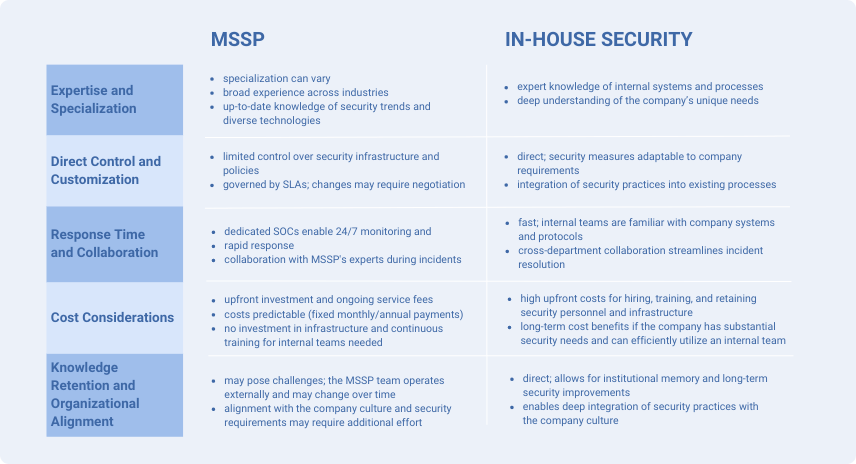
- Insights
Managed Security Services vs. In-House Security: Which is Better for Your Business?
You're in charge of your business and always looking for ways to make processes more efficient. And when it comes to keeping it secure, you want to ensure you do everything you can to protect it.
However, it's no secret that the security industry has changed dramatically in the past decade. And in this changing landscape, it's more important than ever to choose the right solution – one that will support you in most efficiently safeguarding your business in the long run.
But which one is that? Is it better to keep things in-house, or should you outsource? In this article, we'll look at the benefits of using a Managed Security Service Provider (MSSP) compared with having in-house security staff at your company so you can make a well-informed decision. Let's start!

What are Managed Security Services Providers (MSSPs), and why are they here?
MSSPs, short for Managed Security Service Providers, operate by offering managed security services to businesses. MSSPs can provide various services, including security monitoring, detection and response, alarm management services, and other incident response forms. The idea behind an MSSP is that it allows customers to utilize their expertise without hiring and managing their own staff.

By outsourcing security to an MSSP, businesses benefit from expert security knowledge and tools while focusing on core operations. Let's look at how exactly they benefit from managed security services:
- Expertise and specialization: MSSPs are dedicated to security and possess extensive knowledge in managing and mitigating various security risks. They employ security professionals who specialize in different domains, such as network security, threat intelligence, and incident response. By outsourcing security to an MSSP, organizations gain access to a team of skilled professionals who can proactively monitor, detect, and respond to security threats.
- 24/7 monitoring and incident response: Operating round the clock and leveraging advanced Security Information and Event Management (SIEM) systems, MSSPs provide 24/7 monitoring and support from their Security Operations Center (SOC). This constant vigilance ensures that security breaches are immediately identified, investigated, and remediated, reducing the risk of significant damage to the business.
- Access to advanced technologies: MSSPs invest in state-of-the-art security technologies and tools to provide comprehensive protection to their clients. These may include next-generation firewalls, intrusion detection/prevention systems, endpoint protection platforms, data loss prevention solutions, and threat intelligence feeds. By outsourcing security, organizations can leverage these advanced technologies without the need for significant upfront investments.
- Scalability and flexibility: Security needs can vary over time, depending on factors like business growth, industry trends, and emerging threats. MSSPs offer scalability and flexibility to adapt to changing security requirements. They can adjust the level of managed security services based on your evolving needs, ensuring the right balance between protection and cost-effectiveness.
- Cost considerations: Building an in-house security team can be expensive, requiring significant investments in hiring, training, infrastructure, and ongoing maintenance. Outsourcing security to an MSSP can provide cost advantages by eliminating or reducing these overheads. MSSPs usually offer different levels or packages of managed security services so that companies can choose a cost-effective option that fits their budget and requirements.
- Compliance and regulatory support: Many organizations must adhere to industry-specific regulations and compliance standards, such as GDPR. MSSPs often possess in-depth knowledge of these requirements and can assist organizations in achieving and maintaining compliance. They can provide security audits, vulnerability assessments, incident response planning, and documentation support, helping organizations meet their legal and regulatory obligations.
- Focus on core business functions: Outsourcing security to an MSSP allows organizations to concentrate on their core business activities without getting bogged down by security management complexities. This helps to allocate internal resources more effectively and ensures the expertise is being used in areas that directly relate to the company's strategic goals, such as customer service and support.
What is in-house security?
"In-house" security refers to establishing and maintaining a dedicated security team within an organization. It involves employing staff members responsible for handling various aspects of the organization's security needs, such as threat detection and incident response. These internal security experts work directly for the company and are usually located on-site. The scope of internal security can vary depending on the size and complexity of the company's security requirements.

The benefits of having in-house security teams
By establishing an internal security capability, businesses can reap several vital benefits contributing to a robust and proactive security posture. Most importantly, these are:
- Direct control: If you're looking for a security solution that gives you complete control, in-house security might be right. With in-house security, you retain full control over your systems and can customize them to fit your needs perfectly.
- Familiarity with internal systems and processes: In-house security professionals are intimately familiar with the organization's systems, networks, and operations. This knowledge gives them a deep understanding of the unique security challenges and risks specific to the organization, resulting in more effective threat detection and incident response.
- Quick response and collaboration: An in-house security team allows for immediate response to security incidents. The team is readily available on-site, facilitating rapid coordination with other departments and organizational stakeholders during critical situations.
- Deeper understanding of organizational culture: In-house security professionals develop a deep understanding of the corporate culture, values, and dynamics. This knowledge enables them to integrate security practices seamlessly into the organization's operations, making security awareness and compliance more effective.
- Long-term knowledge retention: In-house security teams promote knowledge retention within the organization. Over time, team members accumulate valuable insights, lessons learned, and domain expertise specific to the organization's security landscape. This enables you to continuously leverage this knowledge to improve security practices and mitigate future risks.
The key differences to help you choose:

The choice doesn’t need to be black or white.
Externally managed security services and in-house security can both offer you a lot of great benefits. Your choice will depend on your type of business, budget, resource availability, and overall goals.
And sometimes, it's not black-or-white, but the "golden mean" that makes the cut:
Suppose you don't want to outsource your security. In that case, why not keep your in-house team and hire an MSSP partner that provides you with a specific managed security service for your organization? Many businesses choose to combine in-house security with an outsourced security service like evalink fully managed alarm management. That way, you ensure comprehensive coverage and expertise, leveraging internal knowledge and external resources for enhanced threat response capabilities.




